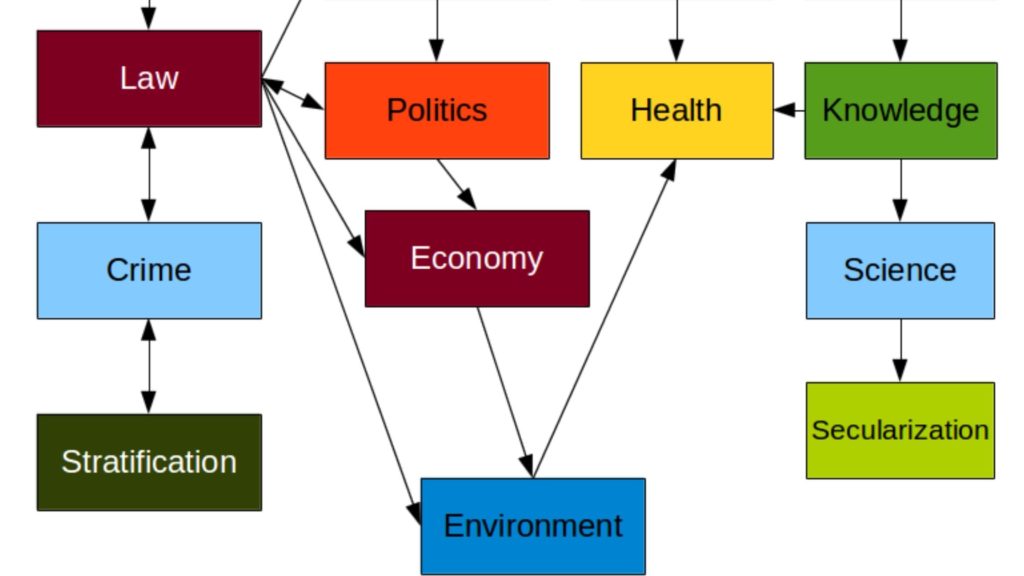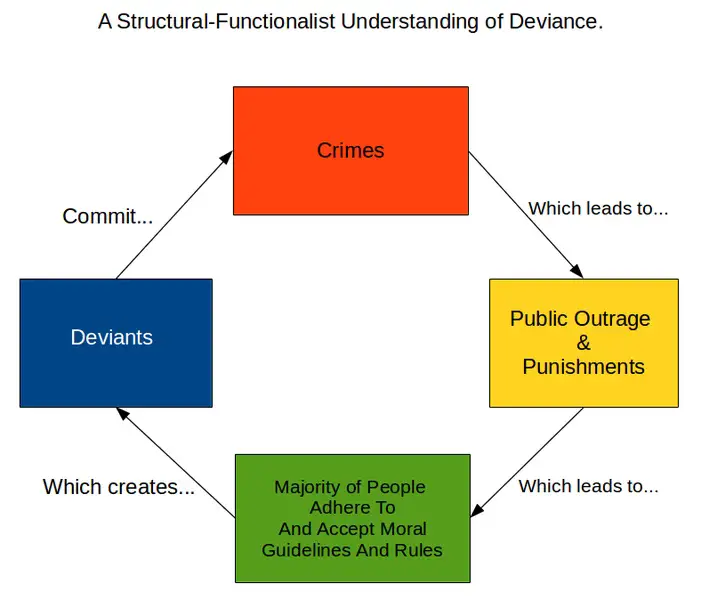The World in Sociological Lens

Before diving into several sociological concepts, let us understand first the dominant perspectives and theories that will serve as a guide on how an aspiring sociologist should look at society.
Click below to go to the main reviewer:
Table of Contents
- Sociological Imagination
- Sociological Perspectives
- Sociological Theories
- References
- Download Article in PDF Format.
- Test Yourself!
Sociological Imagination
When does a personal issue be considered a societal problem?
Charles Wright Mills, or commonly referred to as C. Wright Mills (1916-1962), helped other thinkers clear the distinction between these two by introducing the concept of sociological imagination.
Mills was an American contemporary sociologist and a Columbia University professor who provided a framework for individuals to better understand their social world and for them to make more informed decisions in their daily lives.
Because people have limited scenes with the social world, they do not automatically connect their experiences within their private orbits with the larger societal context. But according to Mills, having sociological imagination is essential for a person to be more aware of his situation. This is a quality of mind that enables one to “grasp the interplay of individuals and society, of biography and history, of self and world” (Mills, 1959).
It is seeing the relationship and connection of the patterns of their own lives within the course of history and the society they are living in. The life that one has now is the result of their own decisions as well as the history and structures in his society.
Challenges that are in one’s immediate milieu are defined by Mills as personal troubles. These are private issues within the individual’s control and character. However, when these seemingly personal troubles are widely shared, Mills argued that these are beyond one’s inner life and can now be considered as public issues—those that are linked to the society’s structures, institutions, and processes. Rather than the individual, its source is rooted in societal patterns.
Having a mindset like this does not happen overnight. It is the task of sociologists to lead people to see connections between these two planes, which will allow the individual to form a sociological perspective of his situation and thus, will be more equipped to act accordingly.
Sociological Perspectives
Sociology uses three lenses as it studies society: positivist, interpretive, and critical perspectives.
| Positivism | Interpretivism | Critical |
| Search for laws and predicts human behavior | Look for meanings and understand how humans make sense of their world | Reveals inequality and struggles |
| Seek to explain | Seek to understand | Seek to change |
| Objective | Subjective | Modified Subjectivity |
| What works? | Why do you act this way? | How can I change the situation? |
1. Positivist Sociology
Echoing August Comte’s ideas, positivist sociology is the application of scientific methods and tools like that of natural science to the study of society. It heavily relies only on facts that can be observed and measured in order to find the natural laws of social behavior.
The validity of knowledge is based on the following:
- empiricism (claims should be observable and experienced).
- value-neutrality (should be objective and not influenced by values, biases, and personal interests).
- unity of scientific method (natural and social sciences should adopt the same procedures and principles in testing).
- law-like statements (general laws must be formulated in studying a specific phenomenon).
Metaphysics and those that do not have empirical evidence would have no room under positivity and be considered invalid.
2. Interpretive Sociology
In contrast with positivism, interpretive sociology takes into consideration the unique point of view of an individual and the meanings he attributes to his actions.
Its focus is neither to make generalizations nor predictions, but to have an in-depth understanding of human activities and to interpret the subjective experience of a certain social action.
It is believed that this perspective was grounded from Max Weber’s concept of verstehen (a German term, which means to understand) and is aligned with the humanities’ hermeneutic traditions.
The heart of this perspective is the meanings and intentions behind social action to arrive at a causal explanation.
3. Critical Sociology
Meanwhile, in critical sociology, the rule of value-free social science does not apply as it originated from social activism, revolutionary struggles, social justice movements, and radical critique.
Its central concept is from Karl Marx’s historical materialism or the belief that societies are shaped mainly by power relations and collective economic activities.
As opposed to the first two perspectives, the goal of critical sociology is not just to explain or understand society, but primarily to change it—with emancipatory interest.
It seeks to use sociological knowledge to ameliorate human and societal conditions.
Though each has their own strengths and limitations, it is best to know that these three sociological perspectives provided the basic knowledge foundations for many great sociological theories that sociologists use nowadays to understand the world and societies.
Sociological Theories
A sociological theory simply means an explanation about a phenomenon with a sociological point of view. Three main sociological theories will be discussed here, namely: structural-functional, symbolic interaction, and conflict theory.
1. Structural-Functional Theory
Structural functionalism theory views society as an organism with interrelated parts that work together to maintain social order.
It studies the roles of institutions and different social processes and how these, in relation to one another, meet both the biological and social needs of the individuals.
A change in one institution will likely cause a change in the other. Parts of the system will adapt to ensure social equilibrium and the continued existence of society.

This theory was drawn chiefly from Emile Durkheim while other sociological theories like Herbert Spencer, Robert Merton, A.R Radcliffe-Brown, and Talcott Parsons contributed to its elaboration.
2. Conflict Theory
Another macro-level theory is conflict theory. Derived from Marx’s perspective, it sees society as a result of the continuing competition of people over limited resources.
It highlights the economic activities of wealth production and distribution, power, and inequality. One of its arguments is that social institutions contribute and help maintain inequalities—whether in terms of economic resources or political power.
With class struggle as the main conflict, social change can only be achieved when the oppressed groups reach class consciousness, or the realization of their exploitation and therefore joining together for potential revolutions.
From conflict theory, the feminist theory was birthed. This was first concentrated on the fight for women’s suffrage and political rights but has now included social gender inequality intersected with race, generalizations about sex and gender, and other more complex social movements such as globalization, post-structuralism, and post-modernism.
But at the core of feminism is to abolish patriarchy or the male-dominant societies and where structures and systems are oppressive and unequal to women.
3. Symbolic Interactionism Theory
Instead of large-scale social structures, symbolic interactionism theory focuses on human actions and the patterns across individual behaviors.
It emphasizes the communication between them and how they make sense of their social worlds through the exchange of language and symbols.
Social reality is claimed to be determined by symbolic interactions among people, rather than the social structures.
George Herbert Mead and Herbert Blumer helped found this theory and it was the latter who coined the term “symbolic interactionism.” This theory has three basic premises:
- Human action is based on the meanings they attribute toward a situation.
- Meanings are formed from their interactions with one another and the society; and
- These meanings are modified through an interpretative process.
References
Little, W. (2014). Introduction to Sociology – 1st Canadian Edition. Victoria, B.C.: BCcampus. Retrieved from https://opentextbc.ca/i
Lumen. (n.d.). Sociological Perspectives. Retrieved from https://courses.lumenlearning.com/wmopen-introtosociology/chapter/sociological-perspectives/
Mills, C., (1959). The Sociological Imagination: Chapter 1. New York: Oxford University Press. Retrieved from https://sites.middlebury.edu/utopias/files/2013/02/The-Promise.pdf
Warr, D. (1999). Personal troubles, public issues, and the reflexive practice of research [Review of the book Health Sociology Review (Vol. 9)]. Retrieved from https://go.gale.com/ps/anonymous?id=GALE|A174057590&sid=googleScholar&v=2.1&it=r&linkaccess=abs&issn=14461242&p=HRCA&sw=w.
Next topic: Elements of Sociological Analysis
Previous topic: The Role and Scope of Sociology
Return to the main article: The Ultimate Social Science Reviewer
Download Article in PDF Format.
Test Yourself!
1. Practice Questions [PDF Download]
2. Answer Key [PDF Download]
Written by Arleia Agustin
Arleia Agustin
A graduate of Bachelor of Arts in Sociology, Arleia Agustin took interest in research and writing during her collegiate years. The time she spent at the University of the Philippines Los Baños taught her the essence of social sciences, to understand the society in each of its facets, and to believe that it could be changed for the better. She loves to read, dream, observe and discover beautiful stories of the people she encounters.
Copyright Notice
All materials contained on this site are protected by the Republic of the Philippines copyright law and may not be reproduced, distributed, transmitted, displayed, published, or broadcast without the prior written permission of filipiknow.net or in the case of third party materials, the owner of that content. You may not alter or remove any trademark, copyright, or other notice from copies of the content. Be warned that we have already reported and helped terminate several websites and YouTube channels for blatantly stealing our content. If you wish to use filipiknow.net content for commercial purposes, such as for content syndication, etc., please contact us at legal(at)filipiknow(dot)net